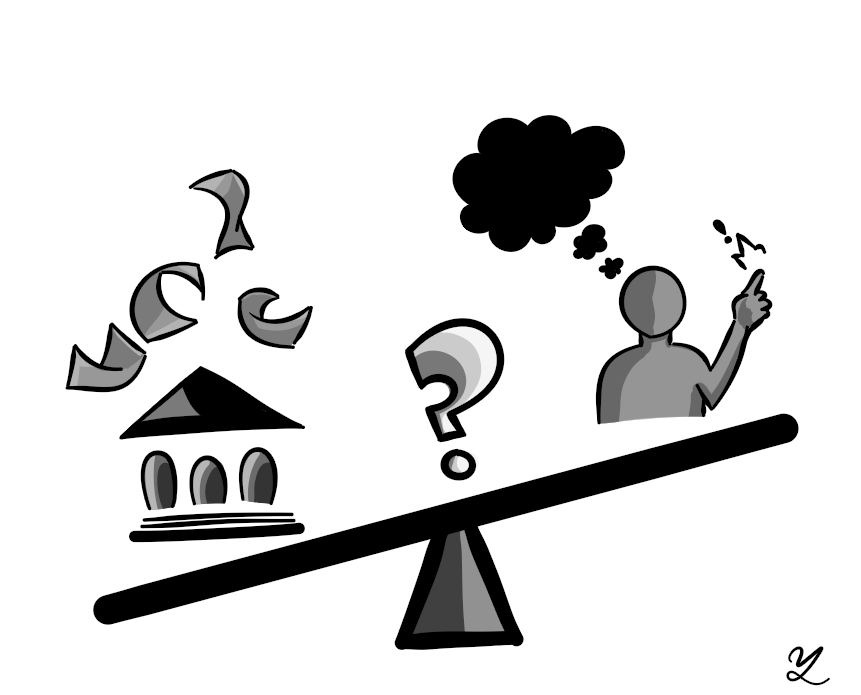
What happens when a staunch anti-establishmentarian gets tapped for Skull and Bones? Or when a grad-school hopeful gets an offer from Bridgewater to earn north of $20,000 in two months?
Well, simple. They accept.
I’m not here to criticize that decision to accept — a decision some might view as “selling out,” or “giving up on one’s principles.” I have a hard time believing that even those who moralize the act of “selling out” would have an easy time turning these — or analogous opportunities — down. Further, I have a feeling that this particular tension will always be an ingrained part of Yale, an institution itself predicated on prestige, class and hierarchy.
As we try and find our place in the world, our idealistic, bushy-tailed selves will inevitably encounter the fact that we are so often part of the institutions that we criticize — and that we, on some deep level, value precisely these institutions in one form or another, whether we like it or not.
As a friend put it, “growing up is doing things you hate”: It is attending a college that has historically bred the future’s elite, taking part in groups that have structurally maintained power hierarchies and perhaps valuing money more than you initially thought. It’s realizing that the reasoning you use to justify such decisions — “oh, I can change the institution from the inside!” — may not hold water, or may never come to fruition.
But I think that’s fine. I don’t think that means that our idealistic selves need to evaporate into nothing. Because I don’t think my friend was exactly right. Growing up isn’t doing things you hate — rather, growing up is learning how to compromise with yourself. It is about learning what values truly inform your worldview, and retaining those values despite what may come.
After all, being part of an institution that has historically conflicted with your values is one thing — actually buying into the entailments of such an institution, actually contradicting your values once you’re in that institution is another.
Think of someone who firmly believes the rich should be highly taxed. Let’s say she then gets a job at a hedge fund and that in this world, the rich still aren’t highly taxed. Well, certainly she’s benefitting from a system she opposes. But that doesn’t mean she needs to buy into the typical, wealth-laced kickbacks that initially motivated her to oppose such an institution. She could donate a large chunk of her earnings or she could serve on the board of nonprofits seeking tax reform. She could act on the egalitarian values that motivated her without rejecting her membership within the structure.
Despite the fact that we at Yale view basically everything as existing along some spectrum, we don’t seem to extend this same courtesy to “selling out.” But I think that this creates a moral binary of black or white and makes it such that if someone sells out, they sell out all the way. We hold a position in which we wholly reject a person’s decision on grounds that often lack the nuance we give to every other type of decision or lifestyle.
There are degrees for everything, and I think that it will never be the case that all Yalies will adhere strictly to the so-called “righteous path.” We exist in a place that would fall apart if this occurred to the fullest extent possible.
Yet, I do think that we can begin to make steps in the direction of healthy compromise. Instead of promoting a culture in which we demonize the act of “selling out,” we should instead promote a culture where we seek to foster responsibility. A place where phrases like “effective altruism” and “responsible citizenship” are more commonly used.
In a school full of flawed people, it’s unrealistic to expect us to be saints, immune from greed, self-interest or prestige. The best we can do is to try and foster in an environment in which those motivations don’t trump the things we value even more. In doing this, we can avoid the worst pitfalls of selling out while maintaining a realistic worldview and upholding the normative standards that we impose on ourselves. While in many cases, moral radicalism may be important for change, realism in one’s perspective also has value. In cases where the former has failed, maybe it’s time to try out the latter.
Leo Kim is a junior in Trumbull College. His column runs on alternate Tuesdays. Contact him at leo.kim@yale.edu .







